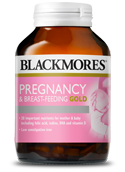The amount of nutrients you should be getting each day is called your recommended dietary intake, or RDI, and these amounts increase for women during pregnancy.
Research suggests that many pregnant women in New Zealand may fall short of their RDIs for some nutrients important for both their own wellbeing and the healthy development of their babies.
Here are just some of these essential nutrients, and why women who are pregnant, breastfeeding or considering pregnancy need to make sure they’re getting enough.
1. Iodine
Iodine is essential for the production of thyroid hormones, which in turn, are critical for the development of baby’s brain, visual motor skills and hearing.
Many pregnant women in New Zealand may not getting enough of this essential nutrient from their diet.
And while the fortification of most breads has helped to increase the daily intake, a daily top up with an iodine supplement of 150 µg micrograms (µg) is recommended for women who are pregnant, breastfeeding or considering pregnancy by the Ministry of Health.
Where you can you get it?
Seawater fish, sea vegetables (seaweed), iodised salt, and fortified bread.
2. Folic acid
In the early stages of pregnancy folic acid, plays a vital role in the formation and closure of the neural tube, which becomes the brain and spinal cord.
Taken a month prior to conception and during pregnancy folic acid may help to reduce the risk of birth defects affecting the brain and/or spinal cord such as spina bifida.
New Zealand guidelines recommend 800 µg of folic acid from supplements for pregnant women.
Where you can you get it?
Green leafy vegetables, mushrooms, legumes, fortified cereals and nuts.
3. Iron
Iron requirements increase markedly during pregnancy, but many New Zealand women of reproductive age have dietary intakes below the RDI.
Healthy iron levels are important in pregnancy to help support energy levels. Iron is important for the production of haemoglobin in red blood cells which transports oxygen to the tissues.
Where you can you get it?
Lean red meat, poultry, fish, dried fruit, legumes, beetroot and tofu.
4. Vitamin D
Vitamin D supports the development of healthy bones and teeth.
A review of nutrient intakes in pregnant New Zealand women suggested that dietary intakes were below recommended levels for vitamin D, while surveys of New Zealand neonates have shown approximately 40-57% of neonates have insufficient vitamin D levels.
Vitamin D also helps to support a healthy immune system.
Where you can you get it?
Vitamin D is produced in the body through sun exposure to the skin. Small amounts of vitamin D are also found in oily fish, eggs and fortified dairy products.
5. Omega-3 fatty acids
DHA (docosahexaenoic acid) is an omega-3 fatty acid which is essential for normal development of the baby’s brain, nervous system and eyesight.
Where you can you get it?
Oily fish including salmon, sardines and mackerel.
Blackmores Pregnancy & Breast-Feeding Gold

Whilst vitamin supplements should not replace a balanced diet you could consider taking a supplement such as Blackmores Pregnancy & Breast-Feeding Gold, which provides a daily dose of 20 important nutrients for mother and baby including folic acid, iodine, DHA and vitamin D3. With a low-constipation iron and odourless fish oil.
Always read the label. Use only as directed. If symptoms persist see your healthcare professional. Vitamin supplements should not replace a balanced diet. Do not exceed the stated dose except on medical advice. If you have had a baby with a neural tube defect/spina bifida, seek specific medical advice.